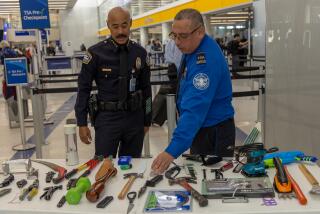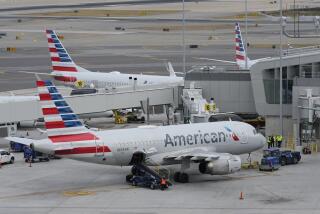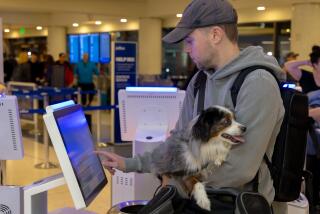Fliers in December and January are more likely to lose luggage
If you plan to fly during the holiday season, the chance of losing your luggage increases sharply.
The rate of mishandled luggage in December was as much as 35% higher than the annual averages for 2008 through 2010, according to a study by NerdWallet, a personal finance analysis website. In January, the lost or damaged rate was as much as 43% higher than the annual averages for 2008-11.
For example, in December 2010, airlines reported an average rate of 4.7 mishandled bags per 1,000 passengers, compared with the average for the year of 3.47 lost or damaged bags, according to NerdWallet Inc. The trend did not hold true in December 2011, when the rate dropped to 3.25 reports, compared with the annual average of 3.33 reports, according to NerdWallet.
Alicia Jao, NerdWallet vice president of travel media, suggested a simple reason: Around the holidays, travelers carry more luggage with them, increasing the likelihood of lost bags.
“During the holidays, people usually check more luggage than when they travel, say, in the summer,” Jao said.
The study also found that the lost luggage rates are higher among regional airlines. The worst offender, according to the study, is American Eagle, the regional carrier of American Airlines. The airline had 9.19 reports of mishandled bags per 1,000 passengers in January 2011 — more than double the average rate for all other airlines that year, according to the study.
Jao suggests regional airlines have a higher mishandle rate because they don’t put a high priority on luggage delivery. Don’t pack expensive items when flying on regional airlines, her website warns.
In a statement, AMR, the parent company of American Eagle, said the airline “continues to make great progress in its baggage performance, with a 28% improvement for the first nine months of 2012 compared to 2011.”
Let disabled passengers board flights first, survey results say
The nation’s airlines would be best improved if they allowed disabled travelers to board first, created child-free zones on planes and stopped charging extra for seats with a few more inches of legroom.
Those were some of the findings when the travel review website SmarterTravel recently surveyed 1,191 of its readers and asked “How should travel change in 2013?”
In the survey, 77% said disabled travelers should get to board first, 58% said airlines should offer child-free zones and 68% said airlines should not charge more for those extra roomy seats that had previously been offered at the regular economy fare.
When asked whether use of electronic devices should be allowed during takeoffs and landings, 22% said yes, 37% said no and 41% said maybe.
Getting around baggage fees
In the first six months of 2012, the nation’s largest airlines collected more than $1.7 billion in fees to check baggage.
One way to avoid such fees is to fly an airline such as Southwest Airlines that doesn’t charge for the first two bags. The other way is more questionable.
Eric Rose, a business consultant who travels frequently, came across the second method on a recent flight on Virgin America. He saw several passengers drag luggage that was too big for the overhead bin to the gate, only to have the gate attendant send the bags into the cargo hold without charging the passengers a check-back fee. The move saved the passengers a fee of $25 a bag.
Rose pointed out the fee loophole in an email to Virgin America Chief Executive David Cush.
The airline executive responded that the company had wrestled with the problem “quite a bit.”
In the email, Cush said the airline tries to spot passengers with too many bags at the security checkpoint. If they get to the gate with extra bags, he said the gate attendants check the luggage without charging a fee so there is no delay in loading the plane.
Cush admitted it’s not the best solution.
“Needless to say, people have figured out the drill,” he said.
The airline said later that Cush stands by the statements he made in the email.






